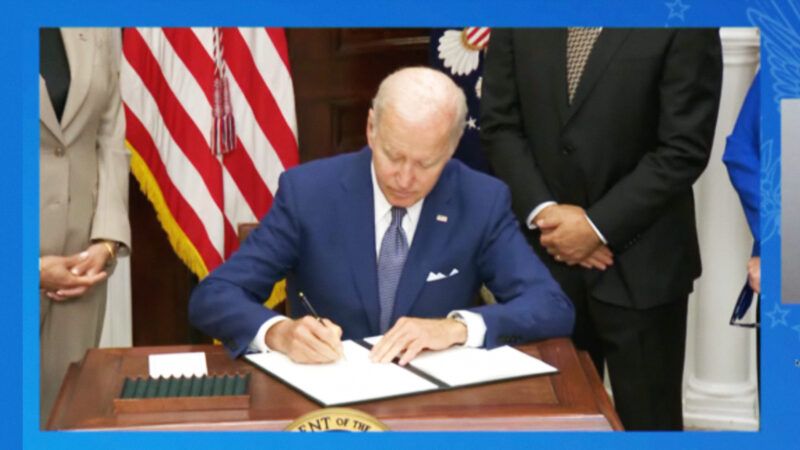Biden Issues Executive Order Designed To Protect Abortion Access
The abortion wars have entered a new phase.

In remarks from the White House today, President Joe Biden laid out a new executive order "protecting access to reproductive health care services."
Flanked by Vice President Kamala Harris and Secretary of Health and Human Services Xavier Becerra, Biden addressed Dobbs v. Jackson Women's Health Organization, the Supreme Court's recent decision overturning Roe v. Wade, which had guaranteed abortion access nationwide for nearly five decades. Biden declared that Dobbs was "not a decision driven by the Constitution [or] by history" but "an exercise in raw political power."
Biden's executive order intends to "protect and expand access" to services that may no longer be constitutionally guaranteed. It instructs the Department of Health and Human Services to ensure that patients have access to contraceptives and abortifacient drugs, as well as safeguarding patient data which some fear could be abused by law enforcement in abortion-banning states. He also called on the Department of Justice, "much like they did in the civil rights era, to do everything in their power to protect these women seeking to invoke their rights."
For weeks, the White House has faced activist pressure to codify abortion rights into law. Biden's order came two weeks after the Dobbs decision, but two months after a draft of the decision was leaked. In June, Rep. Elissa Slotkin (D–Mich.) told Politico, "We knew this was coming and, nationally, didn't have a plan….The other side for 50 years has had a legal strategy—where is our 50-year strategy?"
But there is only so much that Biden can do by himself, especially by executive order alone.
Biden encouraged people to vote, saying that Democrats would need "two additional pro-choice senators and a pro-choice House" to codify abortion protections. His numbers seem off: In May, Senate Democrats failed to pass a national abortion law by even a majority vote, much less the 60 votes needed to avoid a filibuster. Biden said today that if Republicans were to pass a national abortion ban, "As long as I'm president, it won't happen. I'll veto it." But he won't be president forever.
For the most part, the Dobbs decision has made abortion a state-by-state issue. And in the two weeks since the decision was issued, several states have rushed to enshrine abortion protections into law, to counter other states' laws limiting the practice. Some private companies have offered to reimburse employees who have to travel out-of-state to seek abortion services, while some politicians have suggested punishing those companies for doing so.
The abortion wars clearly did not end with the Dobbs decision. Instead, they have entered an entirely new phase.


Show Comments (117)